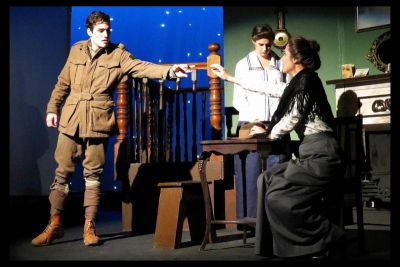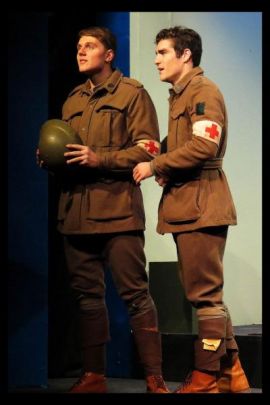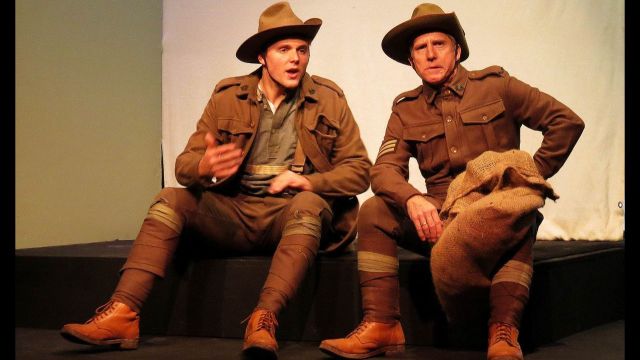Simpson, J 202
To many Australians Private Jack Simpson is ‘The Man with the Donkey’, the brave young Anzac stretcher-bearer who used a little donkey to carry wounded soldiers down the cliffs of Gallipoli. To his family, in England, Jack Simpson Kirkpatrick was a happy, gentle boy who loved animals and had big dreams.
The boy and the hero come to life in Richard Beynon’s carefully researched play that begins when Jack is a school boy near Newcastle, England – and ends in the mud of the Dardanelles in early 1916. It is a touching play that has been directed with great sensitivity by Mark Nagle.
Nagle has worked with his cast members to develop a special ‘feel’ for the poignancy of the story they tell. It is evident that they have become more than an ensemble – that they have been touched and united by the characters they portray and the difficult journey that they make. It has resulted in a production that is tight and controlled, where the emotion builds naturally and the tension is taut.
 In his first major stage role, Ryan Bown plays the character of Jack. Over the course of the play he must take Jack from an 11 year-old reluctant schoolboy to a young man in a country far from home. It is no mean feat, especially when it also involves using a Geordie accent and developing a mother-son relationship that, in this production, is very moving.
In his first major stage role, Ryan Bown plays the character of Jack. Over the course of the play he must take Jack from an 11 year-old reluctant schoolboy to a young man in a country far from home. It is no mean feat, especially when it also involves using a Geordie accent and developing a mother-son relationship that, in this production, is very moving.
Bown finds a natural awkwardness that makes young Jack seem very real, whether he is trying to understand the long words of this teacher, teasing his sister or pleading with his mother. His older Jack is still a little awkward but a bit of a larrikin, especially in the way he relates with his sergeant. This Jack is easy to love and both Bown and Nagle should be very happy with their Simpson, J 202.
Julia Kennedy Scott plays Jack’s Scottish mother, Sarah Kirkpatrick. This is a very demanding role and Scott uses controlled understatement in voice, gesture and expression to make Sarah very convincing and emotionally appealing – and to create strong belief in the closeness of her little family. There are some beautiful scenes where the inner strength of her character reaches far beyond the lines.

Her daughter Annie is played with similar control and understanding by Penelope Berkemeier. The character she creates is strong and is portrayed in her stance and her reactions as well as her words. She listens and watches, and as she does so, her reactions are expressed in her face – a grim frown, an indulgent half smile, a slight rise of the chin. All are very natural and engaging, and very much part of the character.
Thomas Marwick plays Jack’s schoolteacher, Mr Woodvine, strict and pompous, but also compassionate. This is a small role but Marwick carries it with aplomb.
Charles Cosgrove plays Australian soldier Robbie Robertson. Robbie is very different to Jack and finds it hard at first to cope with the way he ignores orders and the animals he collects. But Jack gets to him – and Cosgrove shows this very sensitively in the final moments of the play. As does Rob White, who plays their superior officer, Sergeant Hookway. White typifies the persona of the drill sergeant, but there is a heart beneath the strutting and posing.
When Jack is stationed in Egypt, two Egyptian women, played by Maedeh Timajchi and Leah White, attempt to rob him. This is a short scene but shows Jack’s naïve trust and inexperience – and though she doesn’t say a word, Timajchi’s eyes betray her understanding and her guilt.
The moving final moments of the play are typical of Nagle’s thoughtful direction. In some scenes, a freeze or a pause or a slightly extended reaction say more than any words and Nagle is to be congratulated for the way he has created these moments and for the pace and timing of the production, despite many changes of scene, many split scenes, and some emotional scenes.
Sarah and Annie’s costumes (designer Susan Carveth)are beautifully made and fitted and the lighting (designer Mehran Mortezaei) is very effective.
With so much happening as part of the centenary of the Gallipoli Campaign it is good to see a piece of theatre that looks at a man rather than a battle, at how he came to be there and the family he left behind. Based on military records and the letters Jack Simpson wrote to his mother, the play is tellingly authentic, and Mark Nagle’s production shows great empathy for the writing and the characters – and the effect they can have upon their audiences.
Carol Wimmer
Photographer: Grant Fraser.
Read our feature about plays celebrating the Gallipoli centenary across Australasia
Subscribe to our E-Newsletter, buy our latest print edition or find a Performing Arts book at Book Nook.

